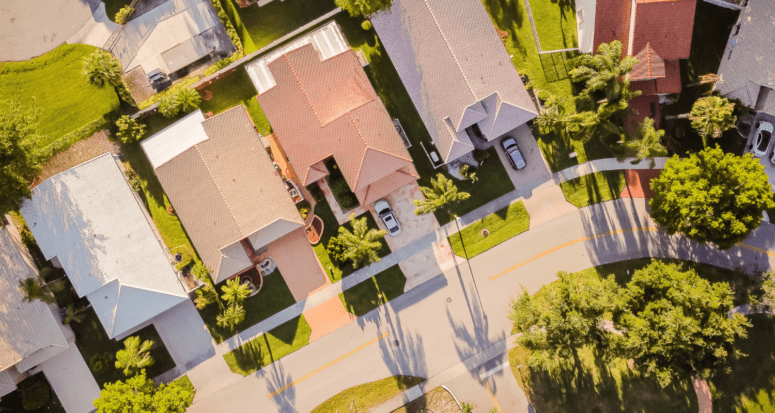Are There Homebuyers Near Me? Yes — And Here’s How to Find Them!
- Published on
- 6 min read
-
 Melissa Rudy Contributing AuthorClose
Melissa Rudy Contributing AuthorClose Melissa Rudy Contributing Author
Melissa Rudy Contributing AuthorMelissa Rudy is a seasoned digital journalist with 15 years of experience writing web copy, blog posts and articles for a broad range of companies. When she can’t buy or sell homes, she settles for the next-best thing: researching and writing about all things real estate-related.
Chances are, the future buyer of your home is closer than you think. Every market has people (and companies) looking to snatch up real estate, whether their goal is to live in it, rent it out, or renovate and flip it. But where are these nearby buyers? And how can you (or your agent) find them, market your property to them, and facilitate a quick sale? We connected with a seasoned real estate agent and some savvy property investors to get their expert tips on targeting local homebuyers.

Cater to ‘high-touch’ buyers
What do we mean by “high-touch?” These are buyers who prefer that their real estate agent sends them curated listings that have been hand-picked for them, rather than having to search through the MLS and find properties on their own.
According to recent stats from the National Association of Realtors (NAR), nearly 30% of homebuyers found the home they purchased through their real estate agent. Ideally, you want agents who proactively seek out properties for their clients to notice your listing and be enticed to pass it along to their buyers.
Ask your own agent how they are leveraging their network to market your listing to prospective buyers in the area:
- Are they connecting with other agents in their office? Often, agents in the same brokerage will share referrals of buyers and homes.
- Your agent might consider hosting a broker’s open house. This is an event where only agents and brokers are invited, and the listing agent markets a property to the other agents to gauge their level of interest. In many cases, another agent will have a buyer in their own network who is a good match for the property.
- A proactive agent will maintain two databases: one with buyers who are actively seeking properties, along with what they’re looking for in a house — size, style, location, price point, and more. The other database will include properties that have recently gone up for sale and their listing details. With both of these lists in place, it then becomes a matter of matching up the right buyers with the right sellers.
Connect with digital house-hunters
Many buyers, even if they have a real estate agent, will actively seek out properties online and then make a list to pass along to their agent. In fact, NAR’s stats show that 52% of buyers find their next house on the internet.
The key to reaching these tech-savvy searchers is to snag their attention while they’re scrolling through listings with smart strategies like these:
Make sure your agent lists your home across all of the major real estate websites
The MLS (Multiple Listing Service) is the most popular database for real estate agents and buyers, offering the ability to search by location, neighborhood, school district, and other filters. There are currently more than 600 MLS databases throughout the country. Most of the third-party real estate websites are automatically populated with listings from the MLS.
Set the price with filters in mind
When buyers (or their agents) are searching on an MLS database for homes that meet their criteria, they will almost always filter by a price range. If your listing is priced at $452,000 and the buyer has set their maximum price at $450,000, they aren’t likely to see your home in their search results. In that case, your agent might recommend lowering the price slightly to make sure you show up in both ranges.
Market your listing on social media
Social media isn’t just for vacation photos and political debates. According to a 2019 NAR report on real estate in the digital age, 26% of real estate agents leverage social media to promote their real estate listings. Facebook was cited as the most popular platform (97% of agents who use social media rely on Facebook), followed by LinkedIn (59%), Instagram (39%), and Twitter (33%).
One example of social media in action: Lisa Lacey, CEO of an Austin, Texas home-buying company, recommends working with your agent to set up a live stream to your open house event page on Facebook and doing a quick tour while there is a crowd of people inside, as a way to drive curiosity and attract more people. Top real estate agent Amanda Howard of Huntsville, Alabama, told HomeLight that her team’s live-streamed open houses attract double the views of recorded open houses.
When interviewing a prospective listing agent, ask about their social media strategy. Do they have existing social media pages so you can follow them and see how they’re marketing their listings? Do they use hashtags properly? Are they familiar with the “live” feature? If their social media presence is lacking (or nonexistent), it might be time to seek out someone who is better attuned to today’s tech-savvy buyers.
“It’s all about having a strong online presentation,” says Andrew Poe, a top real estate agent in Knoxville, Tennessee.
“That might mean professional photography, drones, video photography — the key is to stand out online so potential buyers want to reach out.”

Attract the ‘weekend explorers’
We’ve all heard about the “lookie-loos” or casual Sunday browsers — those people who drift from one open house to the next with no intention of buying. And while it’s true that there will always be curious people who just want to get a peek inside, you don’t want to discount an entire group of people and run the risk of missing out on someone who’s actually interested.
You never know when one of them might pounce and make an offer on the spot. After all, a NAR survey found that 6% of buyers found their house via an open house sign or yard sign — albeit not a huge amount, but it does represent a certain segment of sales.
As you might expect, the best way to target these “weekend explorers” is to host amazing open houses. We’re not talking run-of-the-mill events with trays of cookies, stacks of fliers, and the agent hovering in the wings, ready to pounce on people as they walk in. Instead, your agent might consider creating a more experiential open house that engages potential buyers with a unique activity, a themed party, a multi-house tour, or a home improvement workshop.
“The key is to create the perfect environment to bring out the competitive side of the participants of the open house,” says Lacey. “A casual weekend warrior will turn into a protective buyer if they sense there is a high demand for the house, and may want to buy it if there is a lot of interest among the other participants.”
Another good way to reach “weekend explorers” is through virtual tours. “Since they are not a super serious buyer, this will save you time and energy,” explains Tomas Satas, real estate investor, landlord, and professional flipper. “Virtual tours can also expose these types of buyers to more properties than they would normally see, because they are able to view more homes in different areas without actually having to go anywhere. If they really like a certain home, then you can schedule a showing.”
Meet the neighbors
Neighbors might be good for borrowing tools or shooting the breeze, but they can also be a resource for finding a buyer for your home. According to NAR, around 5% of buyers find their next home through a neighbor, friend, or relative.
Poe often sends letters and postcards to the neighbors of sellers inviting them to his open houses, with the idea that they may bring someone they know who might be interested (or even that they might be open to switching houses in the same neighborhood). If the HOA allows it, he also likes to place a directional sign at the entrance to the neighborhood to draw traffic into the community.
Lacey suggests downloading the Nextdoor app and sharing that you are hosting an open house. And, of course, have your agent put an Open House sign in your front yard to attract people driving by.

Target major house-buying companies
Larger house-buying companies buy homes directly from homeowners using their cash reserves at scale. They purchase properties with the intent of making a profit either by renting them out long-term or flipping them for a profit.
Although these cash buyers may offer a lower price than a traditional buyer, the benefits of a quick closing (sometimes within days), no appraisal requirement, and ability to sell as-is without making repairs or improvements can make this an attractive option for those looking to sell quickly and with minimal hassle.
Examples of major house-buying companies in the U.S. include HomeVestors of America, which owns the “We Buy Houses” franchise across the nation, and Invitation Homes — the largest owner of single-family rental homes in the U.S.
In recent years, tech-enabled companies called iBuyers (or instant buyer) have also entered the scene. These house-buying companies use Automated Valuation Models (AVMs) to calculate the value of a home and then generate an instant offer, sometimes sight unseen. Unlike house flippers, iBuyers typically purchase homes in relatively good to fair condition, make only light repairs, and turn over a higher volume of homes on thinner profit margins. They excel in offering sellers a digital, online home-selling experience.
Entice ‘mom-and-pop’ investors and house flippers
These cash buyers may not have the infrastructure or capital of the major house-buying companies, but they are actively seeking their next investment, just on a smaller scale. According to data from ATTOM Data Solutions, U.S. house flipping reached an eight-year high in 2019, representing 6.2% of all homes sold that year. However, flipping activity subsequently decreased in 2020 due to a shortage of homes for sale. That means if you’re looking to sell to an investor, you likely won’t have much competition from other sellers.
Lou Gimbutis has been buying and selling houses full-time since 2004, first in Michigan and then in North Carolina starting in 2007. He says one of the best ways to find these types of investors is via local Real Estate Investors Associations (REIAs), Apartment Owners’ Associations (AAOAs), and other similar groups.
Another method is to search the county assessor’s site for LLC owners or buyers who own multiple properties, suggests Jacob Naig, owner of a property investment firm in Des Moines, Iowa. “It’s free, but takes a little more work,” he says. “You can narrow it down by location within that county as well. Once you find the name of the owner, you can go back and search that name to see every property for which they hold a title. There are also list providers that will allow you to search for cash buyers or LLC buyers. There will be a small fee, but it can go a lot quicker.”
Joining local Facebook investor groups is yet another great way to target mom-and-pop investors, says Satas. “Build your credibility by answering questions and taking part in discussions,” he says. Status also recommends attending investor events and networking to reach local investors. “Right now, it is even easier to start networking because most events have gone virtual with Zoom meetings, so you can attend as many as you’d like without even leaving home.”

Use Simple Sale to receive a cash offer
In your quest to “find homebuyers near me,” these options may sound great — or they could feel like a lot of work. If you’re in the latter camp of wanting an easy solution, we’d recommend requesting a cash offer through our Simple Sale platform. Through Simple Sale, HomeLight will provide you with a 100% cash offer for your home that allows you to avoid home prep and staging. You’ll also decide when you want to close and avoid agent fees and closing costs. We estimate a home’s Simple Sale price to be 90%-95% of full market value.
Your ideal buyer could be right around the corner
The future buyer of your home might be a friend of your nextdoor neighbor, an investor looking for their next flip in your neighborhood, an iBuyer seeking good-condition properties in your community, or a busy professional who relies on her agent to hand-pick listings that match her preferences. The key is to work with your real estate agent to hone the right strategies to attract different segments of local buyers or reach out to a platform like Simple Sale for a cash offer when you need a fast out. The more irons you have in the fire, the better the chances of finding the right match at the right time.
Header Image Source: (Lesia Gant / Unsplash)
